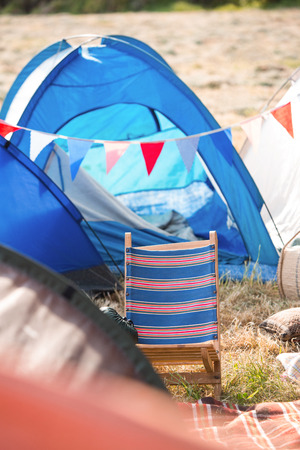Introduction to Leave No Trace in the UK
For British campers, the allure of the countryside—rolling hills, ancient woodlands, and rugged coastlines—comes with a responsibility to protect these cherished landscapes. The Leave No Trace principles embody a core ethos of responsible outdoor behaviour, encouraging everyone who ventures into wild spaces to minimise their impact and preserve the environment for future generations. This approach is especially relevant in the UK, where public access to land is often balanced with private ownership and sensitive habitats. By understanding and embracing Leave No Trace, British campers play a crucial role in safeguarding the nation’s natural heritage. Whether pitching a tent in a Lake District valley or hiking across the Scottish Highlands, adopting these principles ensures that our wild places remain unspoilt and welcoming for all.
2. Planning Ahead: Weather, Access, and Permissions
One of the foundational Leave No Trace principles is thorough planning before embarking on your camping trip. In the UK, this means taking into account the unpredictable weather, understanding legal access rights, and securing necessary permissions. Good preparation not only protects the countryside but also ensures your safety and enjoyment.
Understanding UK Weather Conditions
The British weather is famously changeable. Even in summer, rain and sudden drops in temperature can catch you off guard. Always check the Met Office forecast for your intended area, and pack waterproofs, extra layers, and appropriate footwear. Remember that conditions in upland areas like the Lake District or Scottish Highlands can be far harsher than in lowland regions.
Access Laws: The Countryside Code
The UK does not have universal freedom to roam everywhere. England and Wales have designated public footpaths and open access land, while Scotland operates under more liberal right-to-roam laws. Familiarise yourself with the Countryside Code, which outlines responsibilities such as closing gates, keeping dogs under control, and respecting farmers’ crops and livestock.
| Nation | Main Law/Code | Camping Rights |
|---|---|---|
| England & Wales | Countryside Code CRoW Act (2000) |
Wild camping generally requires landowner permission except in some parts of Dartmoor (subject to recent changes) |
| Scotland | Scottish Outdoor Access Code Land Reform Act (2003) |
Responsible wild camping is permitted almost everywhere except near roads or dwellings; follow leave no trace guidance strictly |
| Northern Ireland | No formal right to roam; local by-laws apply | Wild camping usually requires explicit landowner consent |
Securing Landowner Permissions
Outside of formal campsites or designated wild camping zones, it’s courteous—and often legally necessary—to seek permission from landowners. This applies especially in England, Wales, and Northern Ireland. A quick conversation or written request can prevent misunderstandings and demonstrates respect for those who manage the land.
Checklist for Responsible Trip Planning:
- Check the latest weather forecast for your destination.
- Familiarise yourself with local access laws and any seasonal restrictions.
- If wild camping, identify who owns the land and seek their consent where required.
- Plan your route on established paths where possible to minimise impact.
- Prepare for emergencies—carry a map, compass, and charged mobile phone.
Summary: Why Planning Matters
A successful British camping trip begins long before you pitch your tent. By carefully planning for weather, knowing your rights of access, and obtaining permissions where needed, you not only reduce your environmental footprint but also help uphold positive relationships between campers and local communities.

3. Campsite Selection and Low-Impact Camping
Choosing the right campsite is fundamental to upholding Leave No Trace principles in the UK. When you arrive at your destination, look for existing pitches rather than creating new ones. Many popular spots across the Lake District, Peak District, or Scottish Highlands already have well-worn areas where previous campers have set up tents. By sticking to these, you help prevent further erosion and protect delicate vegetation unique to British landscapes.
It’s equally important to respect established footpaths and avoid trampling through heather, moss, or ferns that take years to recover. If a site appears overused or muddy, move on rather than contributing to its degradation. In crowded locations such as Dartmoor or Snowdonia, camp at least 50 metres from water sources to reduce pollution risks—this is both good practice and often required by local regulations.
When setting up camp, keep group sizes small and avoid altering the landscape: don’t dig trenches or build stone circles. Use freestanding tents rather than pegging into fragile ground, and keep all equipment on durable surfaces like gravel or bare earth. These actions may feel minor but collectively make a significant difference in preserving the beauty of Britain’s wild places for everyone.
4. Waste Management: Litter, Human Waste, and Rubbish
Effective waste management is at the core of Leave No Trace principles for British campers. The philosophy of pack it in, pack it out means everything you bring to a site should leave with you, ensuring the countryside remains pristine for all. In the UK, this includes not only visible litter but also items that are commonly overlooked, such as tea bags (many contain plastics) and wet wipes (which are not biodegradable). Below is a practical guide for responsible waste management on your next camping trip:
Pack It In, Pack It Out: What Does This Mean?
Simply put, every item you bring into nature—whether its food wrappers, bottles, or small pieces of rubbish—should be taken away with you. Even seemingly harmless organic waste, like orange peels or nutshells, can take years to decompose and disrupt local ecosystems.
Responsible Disposal: Local Recycling and Waste Facilities
Whenever possible, sort your rubbish before heading home. Most UK campsites and popular wild camping areas do not have comprehensive waste facilities. Here’s a quick reference table for common waste items and their disposal routes in the UK:
| Item | Best Practice Disposal |
|---|---|
| Plastic Bottles | Take home; recycle in local council bins |
| Cans & Tins | Rinse and recycle at home |
| Food Scraps | Compost at home if possible; otherwise, bag and bin at home |
| Tea Bags | If plastic-free, compost; if not, dispose in general waste at home |
| Wet Wipes | Always take home and bin; never flush or bury |
Tackling Human Waste Responsibly
If wild camping in remote locations without toilet facilities, use a trowel to dig a small hole (15-20cm deep and at least 50 metres from water sources) for solid human waste. Cover the hole thoroughly after use. All used toilet paper and sanitary products must be packed out in a sealed bag—never buried or burned.
Litter Issues Unique to the UK
The British landscape often suffers from specific litter challenges: discarded BBQs on beaches, soggy cigarette butts left by footpaths, and non-biodegradable wipes hidden under hedgerows. As responsible campers, we must set an example by removing even these less obvious items.
Summary Checklist: Leave No Trace Waste Management
- Bring reusable containers and cutlery to minimise single-use waste.
- Plan meals to avoid excess packaging.
- Carry sturdy rubbish bags for all types of waste—including micro-litter like bottle caps and bits of foil.
- Familiarise yourself with local council recycling rules before your trip.
By adopting these practices, British campers can help protect our green spaces for generations to come while honouring both the spirit and letter of Leave No Trace principles.
5. Wildlife, Flora, and Responsible Interaction
Britain’s countryside is home to a remarkable range of native wildlife and plant life that make each camping trip unique, but also demand thoughtful stewardship. Whether you’re pitching your tent in the Lake District or wandering the heathlands of Dorset, it’s essential to respect the habitats you enter. Native species—from elusive wild deer to nesting birds—are often sensitive to human presence. Always observe animals from a distance; never attempt to feed or touch them, as this disrupts natural behaviours and can cause harm. When it comes to flora, stick to established paths and avoid trampling on delicate ground cover, bluebells, or ancient mosses. In woodlands and meadows, picking wildflowers or uprooting plants not only damages local ecosystems but may also breach UK conservation laws.
Seasonal changes bring additional responsibilities for British campers. Spring and early summer are crucial for ground-nesting birds such as skylarks and lapwings; stray dogs or wandering off-path can easily disturb vulnerable nests. During autumn rutting season, give wild deer extra space—stressed animals can act unpredictably and need room to move freely. Always check local guidance before your trip; some areas restrict access during lambing or breeding seasons to minimise disturbance. By tuning into these rhythms and making responsible choices—like keeping noise low, securing food away from animals, and leaving habitats untouched—you play a vital role in preserving Britain’s natural heritage for future generations.
6. Fires, Stoves, and Local Regulations
When camping in the UK, understanding the rules around fires and cooking is crucial for both safety and environmental preservation. Open campfires are often romanticised in outdoor culture, but British landscapes—particularly in National Parks and Areas of Outstanding Natural Beauty (AONBs)—demand a more cautious approach.
Campfire Guidelines
In most National Parks, including the Lake District, Peak District, and Snowdonia, open fires are strictly prohibited. This is primarily to prevent wildfires and reduce long-term damage to sensitive habitats. Instead, campers are encouraged to use portable stoves for cooking. These not only minimise your impact on the ground but also significantly reduce the risk of accidental fires.
Portable Stoves: The Preferred Option
Modern portable gas or spirit stoves are highly efficient and leave little trace. Always set up your stove on durable surfaces—such as gravel or established pitches—and never directly on grass or peat, which can easily scorch or ignite. After use, ensure all parts have cooled before packing away, and check the area for any spilled fuel or litter.
Local Fire Bans and Temporary Restrictions
Some regions may implement temporary fire bans during periods of drought or high fire risk. For example, Dartmoor and parts of the South Downs regularly update restrictions based on weather conditions. It is essential to check with local authorities or park wardens before lighting any flame—even if you intend to use a stove. Disregarding these rules can result in fines and jeopardise future access for everyone.
Respecting Country-Specific Legislation
The Countryside Code provides further guidance specific to England and Wales, while Scotlands Outdoor Access Code offers slightly different advice due to differing land access laws. However, the principle remains: always follow local signage and regulations regarding fires and cooking equipment.
By choosing low-impact cooking methods and staying informed about current restrictions, British campers can help protect wild spaces for generations to come. Remember, the goal is simple—leave no trace of your fire or meal behind.
7. Community Responsibility and Spreading the Word
Embracing Leave No Trace principles is not just about personal choices; it’s about fostering a wider culture of stewardship throughout the UK’s outdoor community. As British campers, we have a responsibility to lead by example and inspire others to protect our landscapes—from the Scottish Highlands to Dartmoor and everywhere in between. Sharing knowledge, whether around the campfire or online, can create ripple effects that help preserve our natural spaces for future generations.
Encouraging Stewardship in Your Circles
Start by demonstrating best practices whenever you’re out camping or hiking. Picking up litter, sticking to established paths, and respecting wildlife are visible actions that others will notice and may emulate. Bring friends along on trips and explain why you make certain choices—like using reusable gear or packing out all rubbish. Your commitment can gently encourage your mates to adopt similar habits, making responsible camping the norm rather than the exception.
Educating Others Effectively
Education doesn’t need to be formal. Simple conversations at campsites, sharing posts on social media, or even writing a quick note in a camping group can make a difference. Focus on the “why” as much as the “how”—people are more likely to change their behaviour if they understand the impact of their actions on local ecosystems. Share resources from reputable UK organisations such as The Ramblers, National Trust, or Leave No Trace UK.
Joining UK-Specific Initiatives
The UK has several campaigns dedicated to responsible outdoor recreation. One notable example is ‘RespectProtectEnjoy’, which offers practical advice tailored to British landscapes and customs. Get involved by signing up for newsletters, attending workshops, or volunteering for clean-up days. Supporting these initiatives not only strengthens your own knowledge but also connects you with a wider network of like-minded enthusiasts who care deeply about the countryside.
Ultimately, each camper plays a part in shaping how we collectively interact with nature. By championing Leave No Trace principles and actively spreading awareness within your community, you help ensure Britain’s wild places remain vibrant and welcoming for all who seek solace under open skies.


